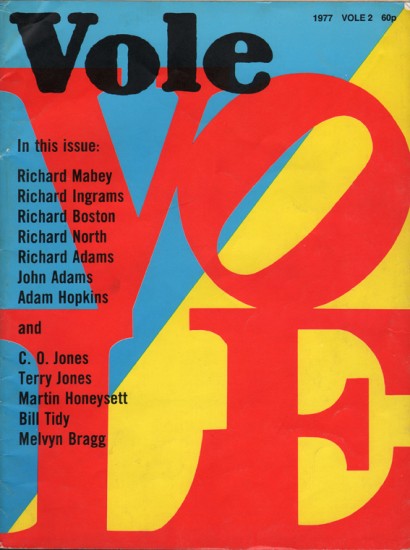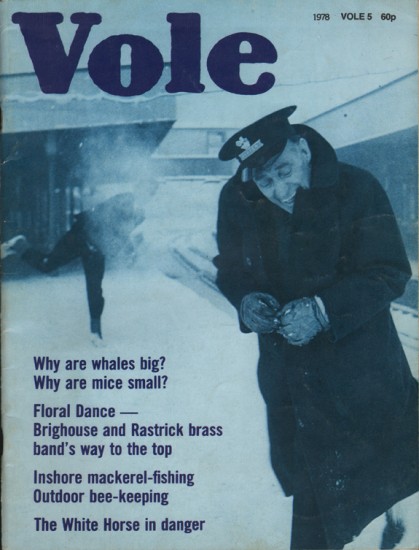Andy Childs remembers Richard Boston.
Jeff’s discovery of the remarkable Country Bizarre magazine got me thinking about other bygone, rurally-inclined magazines that defied the publishing fashion of the times and chose an idiosyncratic road along which to spread their wisdom and love of the good life. Inevitably my thoughts drifted to the wonderful and still much-missed VOLE magazine. VOLE was founded in 1977 and edited by the late Richard Boston, a journalist, book reviewer, biographer, humourist, anarchist, marathon runner, artist, movie extra, and peacenik of whom it was said, by his first wife Anne, that he was the only man she ever knew to wake himself up laughing. I also think that if Chris Yates and the great Roger Deakin are the patron saints of this web-site then Richard Boston is its holy ghost.
I first discovered the work of Richard Boston in The Guardian for whom he wrote an eccentric, witty and consistently amusing column every Saturday during the mid 70s. Having just played a crucial role in helping the Campaign For Real Ale prevent the major breweries from monopolising pub beer with their gassy, headache-inducing poison, Boston was given a regular column in The Guardian in July 1976 in order, ostensibly, to write about this revolution in beer-drinking. But true to form, he quickly tired of the subject and his column developed into a platform for his many interests and passions and was none the worse for it. Cheese, Edward Lear, the French, the railways, truffles, daft place names, the department of transport – these were just a few of the subjects that occupied his thoughts until a year later fresh from winning the main prize in the Glenfiddich Awards for the “civilized appreciation of food and drink” he started a new column called ‘Eating Out’ which in turn eventually meandered and digressed in similarly entertaining fashion. Diversity and a certain unpredictability was always a strong feature of Richard Boston’s life. He was born on Dec 29th 1938, educated at Stowe, trained as a painter at Regent Street Polytechnic, read English (MA) at King’s College Cambridge, and taught in Paris before immersing himself in the poorly-paid literary life. In between working for Peace News (where he had an MI5 file devoted to him), becoming books editor of New Society, and slaving for a pittance as a reviewer for the TLS, he also somehow ran the marathon in Sweden (he was by all accounts a keen athlete), and appeared as an extra in Jacques Tati’s film ‘Playtime’. His marriage to Anne Boston in 1968 lasted eight years and he seemed destined to remain relatively unknown as a writer until CAMRA and The Guardian exposed his talents to a wider audience and probably gave him the confidence to launch his own magazine in 1977.
According to a publicity handout at the time, VOLE was in favour of ‘canals, railways, shove ha’penny, old buildings, mushrooms, civil rights, cycling, recycling, allotments, blue-tits, wagtails, oak trees, voles, conservation, alternative technology, small businesses, village schools, yards, feet and inches, rights of
way, local history, human welfare, Basil Brush and darts’. In other words it was a magazine that held dear those values that make up a quality of life that rejects the consumer-mad, dumbed-down world of big business and duplicitous government that even today threatens to engulf us all in a vortex of insane debt and misery. It was undoubtedly ahead of its time, especially in its coverage of green issues and the environment generally and like Like Caught By The River it laid out, in a way almost certain to capture the attention of people of a certain age and disposition, a way of life that rigorously extolled the endangered traditions, crafts, skills and pastimes of a less frenetic, more civilized way of life. Vole’s contributors included, at various times, a host of Richards besides Boston himself….Richard Mabey, Richard Ingrams, Richard Adams, plus John Arlott, Jonathan Raban, Miles Kington, and Simon Frith, and it appeared monthly from Sept 1977 until I believe June 1981 by which time Richard North had assumed the editor’s role and the magazine had become something of an ecologist’s version of International Times. Somehow, towards the end, it had lost its sense of fun and become too politicized for my taste. I missed the early irreverence and eclecticism of its first three years and still do.
Richard Boston moved on and started yet another magazine – this time the short-lived literary journal Quarto that was soon to merge with The Literary Review. He also had a number of books published including Beer And Skittles(1976), two collections of his columns – Baldness Be My Friend (1977) and Starkness At Noon (1997) plus a biography of Osbert Lancanster, Osbert. In 1994 Later he also stood for election as a member of the European Parliament as the Boston Tea Party on the slogan “it’s a big enough trough and I want to get my nose in it”. Someone once said that he was incapable of being serious for very long and, like a good many humourists, prone to bouts of introspection and melancholy. But he was I believe, beneath the light, irreverent façade, a deeply literary man and a serious scholar. Unless I somehow missed it his writing became more infrequent in recent years although he was supposed to be working on a biography of Cezanne and Zola, and when I learned of his death in December of 2006 I was shocked and very sad that we’d lost such a unique voice. He would I am sure have approved wholeheartedly of Caught By The River. It seems to me to be a direct link to the philosophy, sensibility and aesthetic of VOLE and of Richard Boston’s anarchic, mischevious and erudite writing. How we could do with a hefty dose of his rebellious wit today!

